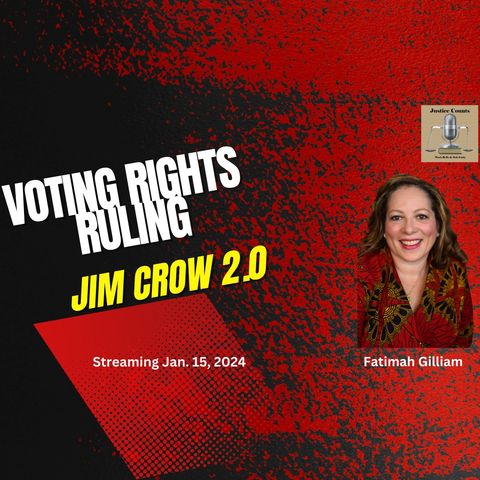Fatimah Gilliam_ Voting Rights Ruling=Jim Crow 2.0

Download and listen anywhere
Download your favorite episodes and enjoy them, wherever you are! Sign up or log in now to access offline listening.
Description
We’re living in a time when a former president refuses to acknowledge his re-election defeat, falsely claiming that thousands of votes were cast illegally. In the aftermath of that, many...
show moreIn the aftermath of that, many states – mostly led by Republicans – are making it harder for people of color to vote on the assumption that they would vote in favor of the Democrats. Even the courts are getting in on the act.
Justice Counts podcast host Mark Bello and I are delighted to welcome author, lawyer Fatimah Gilliam to discuss all of that. So, stay with us. --Fatimah Gilliam, is an author, lawyer, consultant, public speaker, and entrepreneur whose career combines expertise in the law, diversity, human capital, leadership, stakeholder engagement and negotiations. She holds a law degree from Columbia Law School, a master’s in public policy from Harvard University’s John F. Kennedy School of Government and an undergraduate degree from Wellesley College.
Gilliam is the founder and CEO of The Azara Group, which provides diversity and inclusion, leadership development, negotiation and strategy consulting services to Fortune 500 corporations, senior executives of billion-dollar businesses and industry thought leaders. She is the author of a new book, “Race Rules: What Your Black Friend Won’t Tell You.”
So, Fatimah, thanks for joining us today for the Lean to the Left and Justice Counts podcasts.
Mark: So, there’s a case in the 8th Circuit in Missouri that might severely limit voter access. I understand it might be headed to the Supreme Court. What’s it all about? Should our listeners be concerned?
Bob: What’s the make-up of the 8th Circuit panel? In Missouri, it must lean Republican, right?
Mark: Why do Democrats seem to be for more freedom and access to voting, while Republicans want to restrict access?
Bob: Are these efforts racist? Are we talking about blatant bigotry here?
Mark: In general, we have a voting rights act, right? Why isn’t it enough to protect us?
Bob: You speak about what you call “Jim Crow 2.0.” You say that the strategy will strip freedoms and suppress votes of people of color and younger, urban, elderly, and disabled Americans. What’s the strategy and what can people do about it?
Mark: In the materials you provided us, you mention Supreme Court cases of Shelby County v. Holder (2013) and Brnovich v. Democratic National Committee (2021). What do these holdings say and how did they skirt around the voting rights act?
Bob: Do we need a new voting rights act? Will that ever happen if we continue to have divided government?
Mark: There is a big election coming in 2024. Because of the Dobbs decision, abortion will be on the ballot. People will want to vote. It may be the most important election of our lifetime. Talk to us about the law of voting. Do you consider voting a right or a privilege? If it’s a right, what can people do to assure that they can vote in upcoming elections?
Bob: Even if state and local governments put barriers in front of lower and middle-income voters, what can they do to assure that they can vote in 2024? Where do they go to find out what they must do to qualify for a voter registration card?
Mark: Talk to us about “Race Rules: What Your Black Friend Won’t Tell You.” Does the book answer some of the questions we’ve been asking today? Is it a blueprint for citizen’s who want to assure that they have the right to vote in 2024?
Bob: You say that the book provides rare access to what many Black people won’t say to White people, what Black people secretly think and feel about White people’s behaviors and choices. What do Black folks say and feel about White folk’s behaviors and choices?
Mark: You also argue that self-education without behavioral change is half stepping? What behavioral change is needed and what does appropriate self-education look like?
Information
| Author | Mark M. Bello |
| Organization | Mark M. Bello |
| Website | markmbello.com |
| Tags |
Copyright 2024 - Spreaker Inc. an iHeartMedia Company

Comments